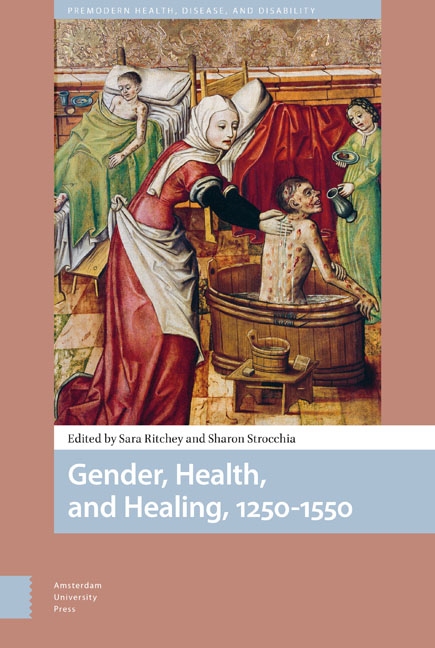Book contents
- Frontmatter
- Contents
- List of Figures and Tables
- Acknowledgments
- Abbreviations
- Introduction: Gendering Medieval Health and Healing: New Sources, New Perspectives
- Part 1 Sources of Religious Healing
- 1 Caring by the Hours: The Psalter as a Gendered Healthcare Technology
- 2 Female Saints as Agents of Female Healing: Gendered Practices and Patronage in the Cult of St. Cunigunde
- Part 2 Producing and Transmitting Medical Knowledge
- 3 Blood, Milk, and Breastbleeding: The Humoral Economy of Women's Bodies in Medieval Medicine
- 4 Care of the Breast in the Late Middle Ages: The Tractatus de passionibus mamillarum
- 5 Household Medicine for a Renaissance Court: Caterina Sforza's Ricettario Reconsidered
- 6 Understanding/Controlling the Female Body in Ten Recipes: Print and the Dissemination of Medical Knowledge about Women in the Early Sixteenth Century
- Part 3 Infirmity and Care
- 7 Ubi non est mulier, ingemiscit egens?: Gendered Perceptions of Care from the Thirteenth to Sixteenth Centuries
- 8 Domestic Care in the Sixteenth Century: Expectations, Experiences, and Practices from a Gendered Perspective
- 9 Bathtubs as a Healing Approach in Fifteenth-Century Ottoman Medicine
- Part 4 (In)fertility and Reproduction
- 10 Gender, Old Age, and the Infertile Body in Medieval Medicine
- 11 Gender Segregation and the Possibility of Arabo-Galenic Gynecological Practice in the Medieval Islamic World
- Afterword: Healing Women and Women Healers
- Contributors
- Index
7 - Ubi non est mulier, ingemiscit egens?: Gendered Perceptions of Care from the Thirteenth to Sixteenth Centuries
Published online by Cambridge University Press: 23 June 2021
- Frontmatter
- Contents
- List of Figures and Tables
- Acknowledgments
- Abbreviations
- Introduction: Gendering Medieval Health and Healing: New Sources, New Perspectives
- Part 1 Sources of Religious Healing
- 1 Caring by the Hours: The Psalter as a Gendered Healthcare Technology
- 2 Female Saints as Agents of Female Healing: Gendered Practices and Patronage in the Cult of St. Cunigunde
- Part 2 Producing and Transmitting Medical Knowledge
- 3 Blood, Milk, and Breastbleeding: The Humoral Economy of Women's Bodies in Medieval Medicine
- 4 Care of the Breast in the Late Middle Ages: The Tractatus de passionibus mamillarum
- 5 Household Medicine for a Renaissance Court: Caterina Sforza's Ricettario Reconsidered
- 6 Understanding/Controlling the Female Body in Ten Recipes: Print and the Dissemination of Medical Knowledge about Women in the Early Sixteenth Century
- Part 3 Infirmity and Care
- 7 Ubi non est mulier, ingemiscit egens?: Gendered Perceptions of Care from the Thirteenth to Sixteenth Centuries
- 8 Domestic Care in the Sixteenth Century: Expectations, Experiences, and Practices from a Gendered Perspective
- 9 Bathtubs as a Healing Approach in Fifteenth-Century Ottoman Medicine
- Part 4 (In)fertility and Reproduction
- 10 Gender, Old Age, and the Infertile Body in Medieval Medicine
- 11 Gender Segregation and the Possibility of Arabo-Galenic Gynecological Practice in the Medieval Islamic World
- Afterword: Healing Women and Women Healers
- Contributors
- Index
Summary
Abstract
This essay studies the feminization of different caring practices by examining the cultural meanings attached to the biblical proverb Sirach 36:27. Touching on diverse sources, it investigates three interrelated contexts of use. In particular, I explore discourses on wifely responsibilities towards the needy husband; on charitable care for the sick and poor; and on the nature and social status of women. I suggest that by using the proverb as an argument, learned men subsumed a wide variety of caring practices under received notions of essentially female duties and innate qualities, connected above all to gendered ideas of compassion. However, the essay also highlights ambivalent attitudes towards female caregivers, as well as their agency and power, that surface within these complex discourses.
Keywords: healthcare, nursing, charity, women, medieval, early modern
The title of this essay is taken from verse 36:27 of the biblical book of Sirach as handed down through the Latin Vulgate: ‘Where there is no woman, the needy groans’. This short proverb appeared in conduct manuals, hospital ordinances, works of literature, and rhetorical tracts throughout the medieval and early modern period. With translations of the Latin into English, French, Spanish, or German, learned men of varying backgrounds related the biblical reference and its renditions to women and caring for those in need, the sick in particular. Broadening its original context of use, which centred on wifely duties towards a needy husband, they brought a range of interpretations and layers to the phrase in order to assert, parody, or call into question the suitability of women as caregivers.
Thus far, no study has been devoted to an analysis of the societal views encapsulated in the proverb. In this essay I consider these meanings and cultural assumptions attached to Sirach 36:27 during the thirteenth to sixteenth centuries. Exploring the proverb's history, I suggest, offers a useful point of entry into long-standing patterns of thinking about women in relation to those in need of care. This approach allows us to examine documented moments when women, as women, were discussed as the most effective caregivers, and to ask what it was about their gender that made them particularly suitable.
- Type
- Chapter
- Information
- Gender, Health, and Healing, 1250–1550 , pp. 191 - 214Publisher: Amsterdam University PressPrint publication year: 2020
- 3
- Cited by

